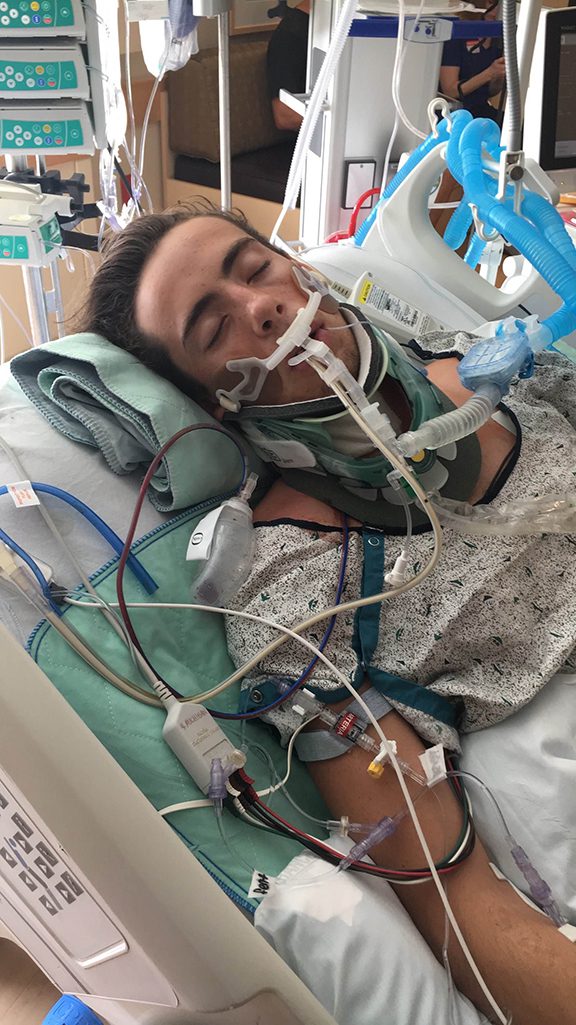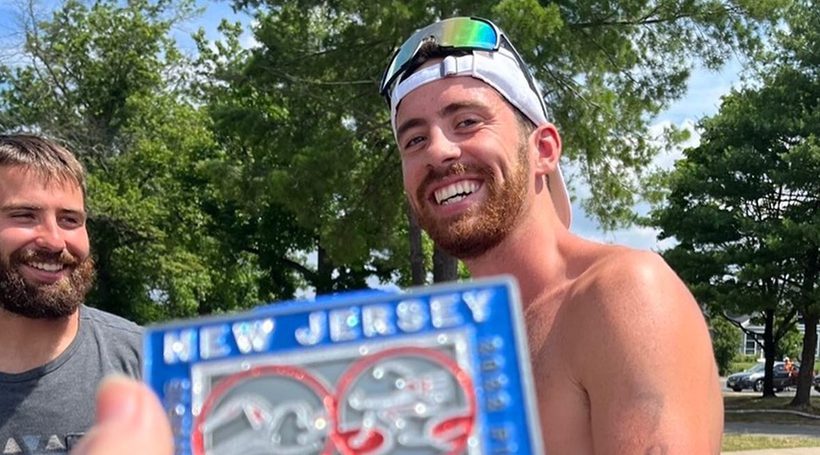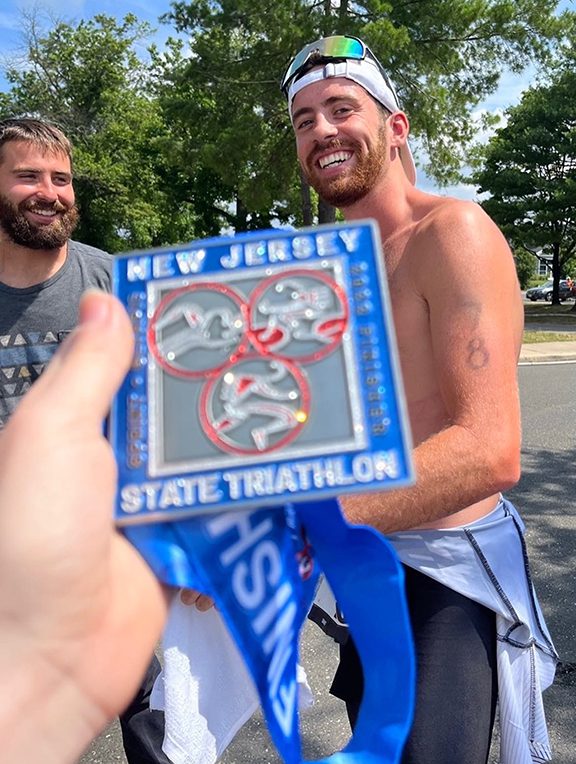When Matt Fumo realized he was going to die, everything got very, very quiet.
In July of 2017, 6 days after his 19th birthday, Fumo dove headfirst off a platform under the Ocean City – Longport Bridge and struck the crown of his head on the bottom hard enough to compress his C4 vertebrae. The paralysis was instant. In just a few feet of water, Fumo was trapped and drowning.
 “At first it was a lot of anxious, suffocating, very dark thoughts. It was super heavy,” he says. “And then eventually when I just had to accept that I couldn’t move and I was drowning, I actually got very peaceful. I had like a million thoughts all at once, and then an absolute peace that I’m probably never going to feel again.”
“At first it was a lot of anxious, suffocating, very dark thoughts. It was super heavy,” he says. “And then eventually when I just had to accept that I couldn’t move and I was drowning, I actually got very peaceful. I had like a million thoughts all at once, and then an absolute peace that I’m probably never going to feel again.”
Then, Fumo’s friend flipped him over, he took a breath, and the world came flooding back in.
“I was like half alive and saying, ‘I just ruined my life.’ I just kept kind of repeating it, along with saying my mom’s name.”
A nurse who’d seen the whole accident from the beach told Fumo’s friends to swim him across the strong current and help him float just off the shore until help arrived. He remembers being loaded into an ambulance and seeing his mom, who’d just arrived on the scene. “I told her I love her, and then I don’t remember much after that,” he says.
Fumo was rushed into the operating room where surgeons performed a procedure to fuse his damaged spinal bones. It was an effort to keep him alive – it was clear to the doctors that Fumo would never recover.
“At my first diagnosis, they called my paralysis ‘complete,’ which means there’s no function underneath the injury,” he says. “They basically electrocuted my body to see if there was any response, and there was absolutely nothing.”
The doctors told Fumo he’d never walk again. In fact, they said, he’d never move anything below his shoulders, and he’d remain on a ventilator for a year or longer.
To mark the 5th anniversary of the accident, Fumo ran a triathlon and finished as the first-place para-athlete.
Before he dove off the bridge, Fumo, who’s now 24 and lives in Upper Township, was a student at Cumberland County College and a baseball star on the rise. A pitcher and outfielder, he was being courted by scouts from a handful of Division I schools. “I was pretty good. I was on the all-decade team for my high school. I was on the all-South Jersey team,” he says.
But in the blink of an eye, it all ended. The news of his paralysis didn’t depress Fumo, it enraged him. “I got really mad,” he says, “and just used that to my advantage as motivation.”
“The breathing tube came out in 4 days,” Fumo says. “Within a week, I moved. Just like 1 tiny little muscle. They thought it was a spasm, but I knew it was me doing it. Eventually, I could do it on demand.”
Fumo fought back, hard. He was walking on his own within 5 months of the injury. Within 2 years, he was running and jumping. Four years post-injury, he could play tennis and volleyball. To mark the 5th anniversary of the accident, he ran a triathlon and finished as the first-place para-athlete.
Of course, he says, things are different now. “It’s not the same as before. If someone knows what to look for, they could probably tell just by the way I run. My gait’s a little off. I have pain in my back all the time, and pins and needles in my hand. I would just call it annoying at this point, because I’m so used to it.”
Fumo says he still struggles with fine motor skills, and needs help to do things like twist the caps off bottles. But overall, his recovery has been remarkable. It was, according to his surgeons, nothing short of miraculous. Fumo credits the team at Mount Laurel’s Project Walk, a paralysis recovery center where he worked to heal his body. “They have clients with all different types of brain injuries or spinal cord injuries,” he says, “but all people dealing with paralysis.”
Once he had his mobility back, Fumo realized he wanted to help other people dealing with injuries like his, and he knew exactly where he could make the most impact: Project Walk.
“I already knew so much about the injury itself,” he says. “They had to see that I could lift people or do the hard exercises. I had to get my Certified Personal Training license.”
While many of his co-workers have a degree in physical therapy or exercise science, Fumo does not. But as a mentor at Project Walk, he brings something else to the table.
“It’s like I have a different way to see it, because I’ve actually felt it,” he says. “The stuff I tell clients sometimes, the trainers will be like, ‘Oh, I wouldn’t ever think of saying that, doing that. It can help so much to hear things from a firsthand perspective. I can look someone in the eyes, and it’s like we understand each other.”
Fumo’s working on getting certifications to help him become a specialist at Project Walk, but he wants to help people dealing with paralysis recover more than just physically.
“I would say the mental aspect is like 80 percent of a spinal cord injury,” he says. “Especially because the brain-body connection has been severed.” Often, accidents like Fumo’s – and the arduous recovery afterward – leave lasting trauma.
“I just want to help other people who have been through something like me and are going through it mentally,” he says. As much work as it took him to recover physically, Fumo says it was even harder to heal his mind.
“I’ve had some therapy. I do a lot of meditation and breathing exercises,” he says. “I journal all the time, I read all the time. And I just try and find different ways to help myself.”
It’s an ongoing battle. When he’s working with someone at Project Walk, he’s focused and professional, but occasionally a patient’s story will force him to relive his own, and that can be challenging. “It’s definitely hard at times,” he says. “I have to go to the bathroom or go outside just to cool off.”
As far as Fumo is concerned, his accident is firmly in the past. But that doesn’t mean he forgets. “I actually go back to the spot where it happened every year on that date,” he says. “It’s a weird thing to do. But I just go and reflect on the last year. It’s another way of learning to accept it.”
While the injury has changed Fumo’s life forever, it’s also left him feeling grateful to be alive, and forced him to believe in miracles. He’s got big plans too – traveling and writing a book about his experience. The young survivor says he’s going to keep moving forward, and he hopes to bring others along, too.
“Nothing’s really impossible,” he says. “You get to live this life for just a little bit, so you have to enjoy it while you have it.”



 To mark the 5th anniversary of the accident, Fumo ran a triathlon and finished as the first-place para-athlete.
To mark the 5th anniversary of the accident, Fumo ran a triathlon and finished as the first-place para-athlete.










